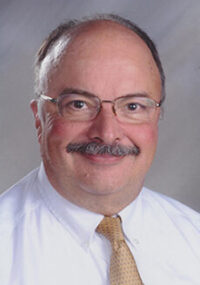We invite Jesus in, but who is He for us?

By Tim Irwin
Second Sunday of Advent/Dec. 6
Isaiah 40:1-5,9-11; Psalm 85:9-10,11-12,13-14; 2 Peter 3:8-14; Mark 1:1-8
Advent seems to be somewhat of a lost season, drowned out by the ever-lengthening time dedicated to the secular side of Christmas. These days, Santa just can’t seem to keep his rotund self on this side of Thanksgiving. So, we face a bit of a challenge when trying to focus ourselves on what can be a very spiritually productive liturgical season.
The term “advent” derives from the Latin adventus meaning a coming or an arrival referring, of course, to the birth of Jesus. Over time, it became associated with the second coming of Christ and we might also consider it in terms of the continuous coming of Jesus in the Holy Eucharist. Advent commences on the Sunday closest to Nov. 30, the feast of St. Andrew. In the Eastern Orthodox tradition and some rites in the Catholic Church, it covers six weeks beginning on the Sunday closest to the feast of St. Martin, suggesting a more Lent-like observance than we typically experience. That said, the Church celebrates Advent as a penitential season. It’s our yearly opportunity to reflect on that first great question that Jesus asked of His apostles, “Who do you say I am?”
The first reading for the Second Sunday of Advent comes from the prophet Isaiah who writes, “Then the glory of the Lord shall be revealed, and all people shall see it together; for the mouth of the Lord has spoken.” The Children of Israel longed for their Messiah. They recognized that their need for salvation could only be fully realized when he appeared. His appearance would be announced by a voice crying out, “In the desert prepare the way of the Lord! Make straight in the wasteland a highway for our God!”
The second reading from the Second Letter of St. Peter connects the first coming of the Messiah heralded in Isaiah with His second coming, suggesting that being ready may be far more challenging than first thought. Peter writes, “But the day of the Lord will come like a thief, and then the heavens will pass away with a mighty roar and the elements will be dissolved by fire, and the earth and everything done on it will be found out.”
A TIME TO PONDER
The Gospel reading from Mark recounts the ministry of John the Baptist. He is the voice crying out as foretold by Isaiah. Mark writes, “John the Baptist appeared in the desert proclaiming a baptism of repentance for the forgiveness of sins. People of the whole Judean countryside and all the inhabitants of Jerusalem were going out to him and were being baptized by him in the Jordan River as they acknowledged their sins.”
John says, “One mightier than I is coming after me. I am not worthy to stoop and loosen the thongs of his sandals. I have baptized you with water; he will baptize you with the Holy Spirit.”
Being clear concerning John’s role in salvation history is an important matter for the Church. So much so, that the Gospel reading for the Third Sunday of Advent recounts this same episode, this time according to St. John. The Evangelists writes “When the Jews from Jerusalem sent priests and Levites to him to ask him, “Who are you?” John the Baptist answers, “I am not the Christ.” The Church lays it out plain and simple: John the Baptist is not the Messiah — Jesus is the Christ.
Now, it’s up to us. Who do we say Jesus is? Advent is the season to ponder this question and the Church’s answer to it more deeply. When you receive Holy Communion this Sunday, who have you invited in? Who do you say Jesus is?
—
Tim Irwin teaches theology and philosophy at Notre Dame High School in Peoria. He is a member of Blessed Sacrament Parish in Morton.





